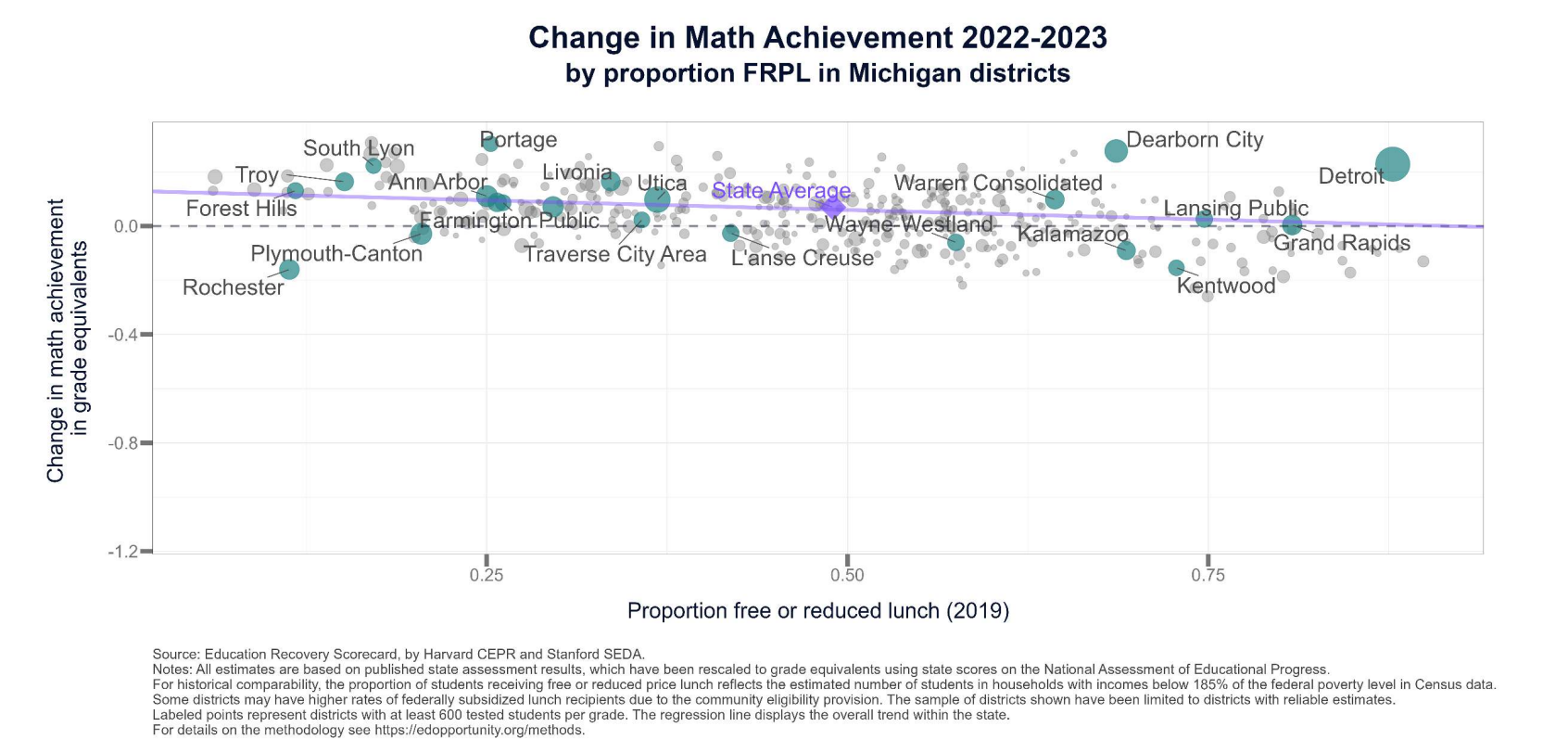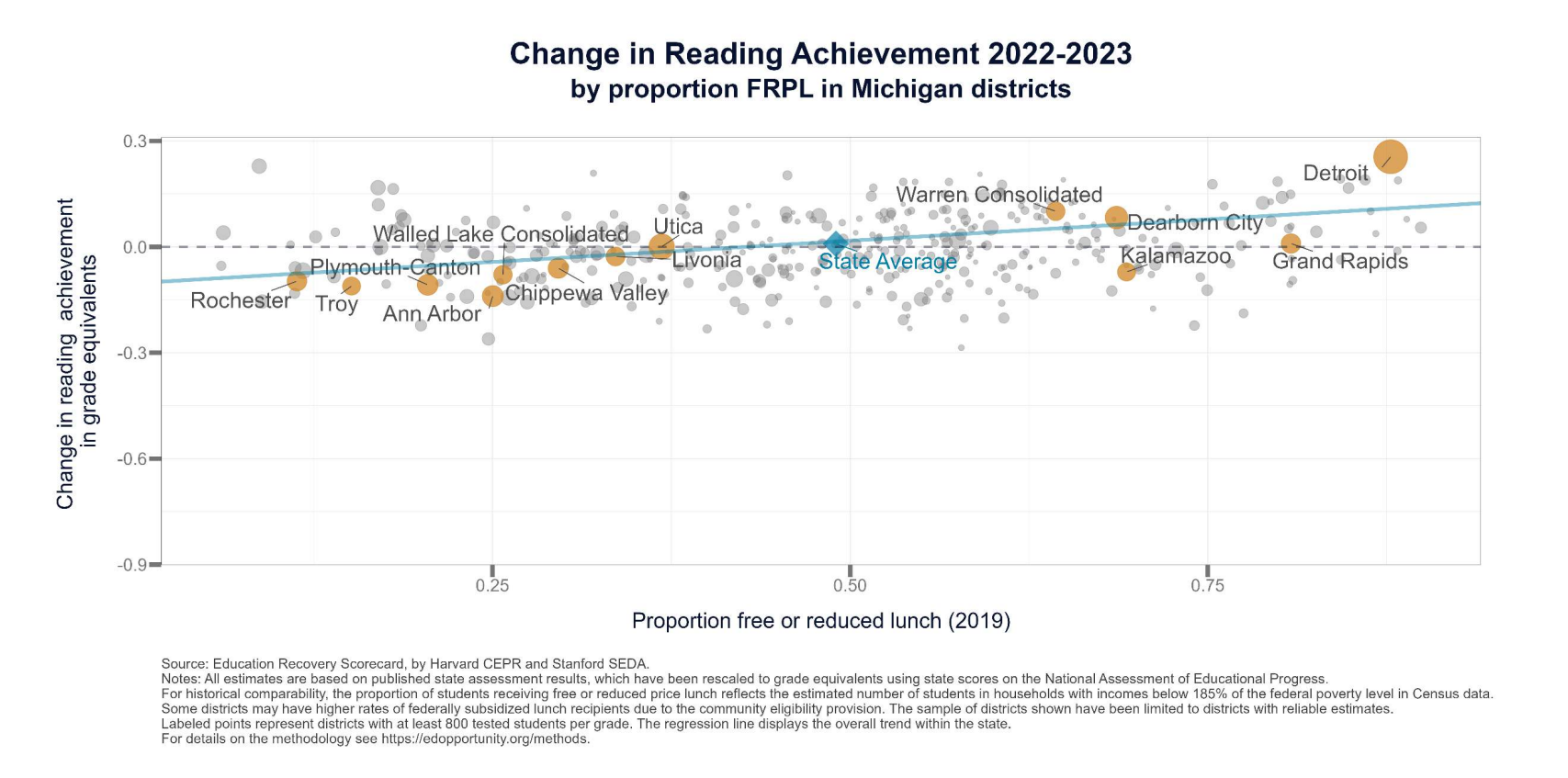DPSCD Overcoming Learning Loss and Accelerating Student Achievement Post-Pandemic Faster than Most Districts in Michigan and Nationally
Detroit Public Schools Community District (DPSCD) received independent confirmation of its post pandemic recovery despite opposing trends nationally. This is according to The Educational Recovery Scorecard, a joint research effort from the Educational Opportunity Project at Stanford University and the Center for Education Policy Research from Harvard University. The report revealed that DPSCD outpaced national pandemic recovery in both reading and mathematics, and significantly outperformed the state of Michigan. Although there is still considerable work to improve academic outcomes for all students, this is a clear indicator that our work is making an impact.
- While economically disadvantaged students in the state lagged behind their peers in Math, DPSCD's 22-to-23 improvement (+0.23 grade levels) was twice that of Michigan's non-economically disadvantaged students (+0.11);
- In Reading, DPSCD's 22-to-23 improvement (+0.26 grade levels) was considerably greater than Michigan's economically disadvantaged students (+0.03) and Michigan's non-economically disadvantaged students (-0.03); in fact, this performance was in the top ten among Council of Great City Schools districts; and
- While the district has not fully recovered learning for students who lost significant ground during the pandemic, DPSCD’s investments are yielding greater returns than nearly every other traditional public school district in Michigan, and proficiency rates are exceeding historical performance in several grades and subjects.
These studies confirm what DPSCD realized in shared national, internal, and state assessment scores, District students are closing the learning loss gap at a greater clip than their peers – including those in Districts with more reoccurring local/state revenue. Internal analysis indicated DPSCD students lost proficiency at a slower rate than the state, county, and city charter school average while also showing more improvement in post-pandemic improvement in proficiency as compared to the same groups. Shared internal assessments also demonstrated these points as compared to other large urban districts nationally. This study expands on this and shows that all students, not just students at our near proficiency, made major strides during the 2022-23 school year.
“These results are a direct result of the focus and intentionality we have had with school improvement efforts before, during, and after the pandemic, as well as our strategic use of one-time federal COVID funds to overcome the challenges of the pandemic. I thank our teachers, staff, administrators, and School Board for embracing, even when difficult, the challenge to rebound and refocus our commitment to student achievement despite the real challenges created and exacerbated by the pandemic,” said Dr. Nikolai Vitti, Superintendent, DPSCD.
“To continue this moment, our District will continue to focus on the reform efforts that have the greatest impact on student learning, including providing wrap around services to support student attendance, teaching high quality, standards-aligned curriculum, and investing in teacher and administrator effectiveness. We will do this while engaging, empowering and activating our families and the community in support of students’ success, just as we did at the height of the pandemic.”
Looking ahead, the District’s new strategic plan will emphasize each of these activities, but will lead with a goal of improving student attendance. Across the nation and particularly in Detroit, regular school attendance is a lingering challenge after the pandemic, and poor attendance hampers student learning and progress. “We need students, families, the community, and state and local government to link arms and help address this issue. Improvement is only possible if we take collective action,” Vitti said.
“This report is refreshing and exciting, it is rewarding to receive confirmation that the hard decisions made are yielding tangible outcomes. We are on to something special here and we all feel the shift in realizing there is no limit to our students’ talent. As leaders, we must be bold and unapologetic about advocating for what our students need and deserve; this will give DPSCD the fuel it needs to continue to push for equitable funding. When we all work together, student outcomes are positive. We all benefit,” said Angelique Peterson-Mayberry, President, DPSCD Board of Education.
Two graphics from the full report for DPSCD demonstrate the strength of DPSCD’s performance relative to other districts in the state. The DPSCD report is available here: Education Recovery Scorecard



